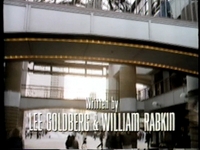Not too long ago,
I spoke about screenwriting and breaking into television at a writer’s
conference in San Francisco. Afterwards, I mingled with the attendees and had some
bizarre conversations. Here’s a sampling…
"I’ve written a novel and everyone tells me it’s a script," one woman said. "How do I turn it into a script?"
"Well, you write a script." I said.
She stared at me. "How do I do that?"
"You get a book or take a course, learn the principles of screenwriting, and then you write a script."
"That’s too much work," she said. "Isn’t there software that can do all of that for me?"
"Yeah," I said. "The same way Microsoft Word wrote your book for you."
* * * * * *
Another person came up to me and asked me if I wrote for television. I said yes. She then asked, "How do you do that?"
"You mean, how do I write for television?"
"Yes," she said.
"I write screenplays," I said.
"Which is what, exactly?"
"The story, the action, the words that the characters say," I replied.
She stared at me. "Somebody writes that?"
"Yes,"
I said, resisting the urge to strangle her. "It’s like a writing a
play, only for the camera instead of a theatre audience."
She shook her head. "No, it’s not."
* * * * * *
"I’ve written a book but everyone tells me it s a TV series," the man said. "How do I make it into a TV series."
"You
can’t, " I said, and gave my standard speech about how ideas are cheap
and execution is everything, how networks go to people with TV
experience, or who have written hit movies, or who have written
bestselling novels, blah blah blah. And when I got done, he stared at
me. I got stared at a lot that day.
He said: "How can I get around that?"
"You can’t," I said.
"Why not?"
"Because
you haven’t established yourself as a writer in any field," I said.
"Why would a network, studio or producer buy a TV series idea from you?"
"Because I’m smarter and more talented than they are," he said.
"It’s not going to happen," I said.
"Is it because I’m black?" he said. "That’s it, isn’t it. It’s because I’m black."
* * * * * *
"Did you have to sleep with a lot of people to get into TV?" a woman asked me.
"Just my wife," I said.
"You were lucky it wasn’t someone else," she said and walked away.
* * * * * *
"I
have a great idea for a movie," a woman said to me. "What’s the market
like for true stories about black lesbians in the 1880s?"
"I
don’t think studios are looking for scripts to fill that particular
niche," I said, "but there’s always a market for good stories that are
told well."
"Oh," she said. "That’s going to make it a lot harder to sell."
* * * * * *
"Mysteries
are hard work," a man said to me. "Could I write an episode of a
mystery show but leave out the mystery for someone else to do?"
"No," I said.
"But my talent is character and I’m brilliant with dialogue," he said. "I really don’t know how to plot a mystery."
"Then don’t write a mystery," I said.
"But that’s what’s selling," he said.
"Don’t try to write what’s selling," I said. "Write what you enjoy. Write the story you want to tell."
"The thing is, I don’t know how to tell stories," he said. "But I write killer dialogue. Is a story really necessary?"
"Yes," I said.
"You
people in Hollywood don’t make it easy, do you? That’s the problem with
the Industry. They are constantly creating obstacles so people can’t
get in."

